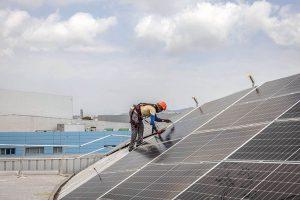BLOOMBERG
Who is responsible for the cleanup of China’s air and water? What is the impact of wildfire smoke on your health? And why is free electricity a problem for solar? Every week on Bloomberg Green’s Zero podcast, Akshat Rathi invites guests to explore the tactics and technologies taking us to a world of zero emissions. Here are some recent episodes.
Solar is booming business, with fierce competition and rapidly increasing efficiency driving the cost of panels — and the energy they produce — ever lower. As costs have fallen, installation rates have skyrocketed: the first terawatt of solar took almost 70 years to be installed, the second terawatt is likely to be reached by 2025, just three years after the first. “People are very, very bad at forecasting revolution,†says BNEF solar analyst Jenny Chase. “But the energy transition is genuinely a completely new way of doing things.†Chase joins Zero to discuss her predictions for the growth of solar, why solar manufacturing is “horrible business,†and how free electricity might be the biggest challenge the industry faces.
Few countries have managed to successfully pass a carbon tax, but Canada is one of them. The trick? “Give the money back,†says Catherine McKenna who, as environment minister of Canada, was tasked by Prime Minister Justin Trudeau to implement the policy. The road was rough for McKenna who received death threats and was given the moniker ‘climate Barbie’ by conservative politicians. The country adopted its “revenue neutral†price on pollution in 2018, starting out at C$20 ($15.2) per ton of emissions and set to rise to C$170 by 2030. Critics say that Canada’s carbon tax is yet to drive down its emissions at the pace needed, largely because of its oil and gas sector. McKenna says that as the price increases, it will begin to make a real impact — let’s hope she’s right.
China is the world’s factory, and emits more CO2 than any other country on the planet. But in a planned economy, with weak environmental regulation, can anyone take on this pollution? Ma Jun, a journalist turned environmental campaigner, did. In 2006, he began publishing pollution maps online that detailed sources of air and water pollution. He faced pushback from government and business, but his work made it possible for people in China to monitor and discuss the twin problems of pollution and climate change.
 The Gulf Time Newspaper One of the finest business newspapers in the UAE brought to you by our professional writers and editors.
The Gulf Time Newspaper One of the finest business newspapers in the UAE brought to you by our professional writers and editors.
